

Special educational needs teacher: Job description. A special educational needs (SEN) teacher is specifically employed to work with children and young people who need extra support, or require an advanced programme of learning in order to reach their full educational potential.

SEN teachers may work with individuals who have physical disabilities, sensory impairments (i.e. hearing or visual), speech and language difficulties, learning difficulties such as dyslexia, conditions such as autism, social, emotional and mental health needs, or have a combination of these difficulties. A SEN teacher may also work with gifted and talented individuals. A key aspect of working in this field is identifying individual needs and being responsible for creating a safe, stimulating and supportive learning environment. Typical work activities. Teacher (special educational needs): job description. Special educational needs teachers provide a general education to children who have behavioural, emotional and/or learning difficulties or who are considered to be 'gifted'.

What does a special needs teacher do? Typical employers | Qualifications and training | Key skills Typical job responsibilities include: Special educational needs teacher job information. Page Content Special educational needs teacher Hours35 per weekStarting salary£22,244 + per year.

Special needs teaching assistant job information. Page Content Special needs teaching assistant Hours30-40 per weekStarting salary£12,000 + per year If you are keen to help children and want to work in a school, this could be an ideal job for you.
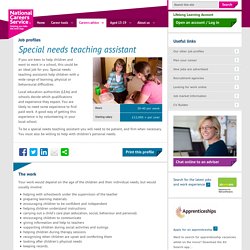
Case studies: Special educational needs teacher: Lucy. Lucy shares her experience of working in special educational needs and how she got into it so early on in her career...

I have always been interested in working with pupils with special educational needs (SEN). I took a gap year before my undergraduate degree in English studies and worked as an SEN teaching assistant in various schools, something I found really valuable and enjoyable. After my PGCE at the University of Derby, I had several temporary teaching roles in mainstream primary schools, which helped me to gain experience. However, I was still keen to work in an SEN setting and, after this, secured a more long term temporary role in an SEN school, covering maternity leave. SEN content. Special Educational Needs - Teacher Network UK. European Agency for Special Needs and Inclusive Education. The topic of Teacher Education for Inclusion has been highlighted by all Agency country representatives as being of top priority.
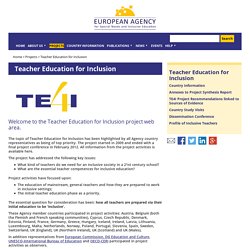
The project started in 2009 and ended with a final project conference in February 2012. All information from the project activities is available here. The project has addressed the following key issues: What kind of teachers do we need for an inclusive society in a 21st century school? What are the essential teacher competences for inclusive education? Project activities have focused upon: The education of mainstream, general teachers and how they are prepared to work in inclusive settings;The initial teacher education phase as a priority. The essential question for consideration has been: how all teachers are prepared via their initial education to be 'inclusive'.
Five%20Key%20Messages%20for%20Inclusive%20Education. Education professionals. If you are working with blind and partially sighted learners from birth to 25, including those with complex needs, at RNIB we want to offer you support.
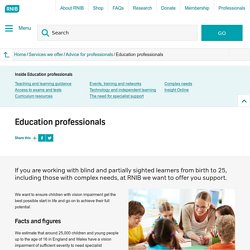
We want to ensure children with vision impairment get the best possible start in life and go on to achieve their full potential. Facts and figures We estimate that around 25,000 children and young people up to the age of 16 in England and Wales have a vision impairment of sufficient severity to need specialist educational support. As many as 50 per cent have additional disabilities, including some who have very complex needs. BILD, the British Institute of Learning Disabilities - Welcome. Cambian Group: Provider of children's services. Action on Hearing Loss. Working With Blind Children. Author: Jack Claridge - Updated: 9 August 2013| Comment There are many different aspects to working with children but perhaps one of the most challenging and likewise most rewarding is that of working with blind children.
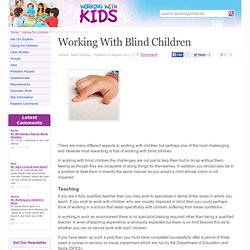
In working with blind children the challenges are not just to help them but to do so without them feeling as though they are incapable of doing things for themselves. In addition you should also be in a position to treat them in exactly the same manner as you would a child whose vision is not impaired. Teaching If you are a fully qualified teacher then you may wish to specialise in terms of the areas in which you teach. In working in such an environment there is no specialist training required other than being a qualified teacher. If you have taken up such a post then you must have completed successfully after a period of three years a course in sensory or visual impairment which are run by the Department of Education and Skills (DFES).
Teaching Assistant Child Care. Contact - for families with disabled children. Volunteering. Education Support. In England, we offer expert, independent advice to help make sure blind children are supported at school, and that they attend the nursery, school or college that’s right for them.

In Scotland, Northern Ireland and Wales, we work closely with other charities to provide information and support around the education system. The education system can be very complex. Finding out how to get specialist support that will meet a child’s individual needs and assisting them in their journey from nursery to further or higher education can be daunting for parents and carers. Our Education Support team is on hand to help children and young people with sight loss to get the best from their education. Essential SEN Links Database ⋆ Special Educational Needs. iCan - Site maintenance. Humanising Language Teaching Magazine for teachers and teacher trainers. Anna Maria Aiazzi, Italy Anna Maria Aiazzi graduated in Modern Foreign Languages (English Language and Literature) at the University of Florence on October 29th, 1999, discussing a thesis on V.
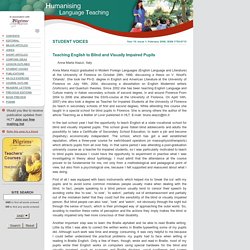
Woolf's 'Orlando'. She took her Ph-D. degree in English and American Literature at the University of Florence on July 19th, 2004, discussing a dissertation on English Modernist writers (Vorticism) and Quantum theories. Since 2002 she has been teaching English Language and Culture mainly in Italian secondary schools of second degree, in and around Florence From 2004 to 2006 she attended the SSIS-course at the University of Florence. On April 14th, 2007) she also took a degree as Teacher for Impaired Students at the University of Florence (to teach in secondary schools of first and second degree).
In the last school year I had the opportunity to teach English at a state vocational school for blind and visually impaired pupils. References Voice Blindness in "Wikipedia" (www.en.wikipedia.org). BATOD. Every Local Authority must make adequate provision for the range of needs within its education service. This document is written to inform Children’s Services, Teachers and their line managers, potential Teachers of the Deaf (ToDs) of the range of tasks and skills that are part of the competences required by the DCSF to meet the specialist qualification as a Teacher of the Deaf. It is important to identify the role of the Teacher of the Deaf and what it brings to the individual deaf learner and to the educational provision for that learner.
This is not an exhaustive list – some ToDs will not be involved in every item and there may be other situations where the ToD is expected to be active. Throughout this document the term 'deaf' is used to cover the whole range of hearing loss. BATOD. This page gives a brief description of the work that Teachers of the Deaf do, then describes the qualifications needed and how to obtain them. Any degree of deafness may cause significant educational and social problems.
Children who are born severely or profoundly deaf need skilled teaching to develop language and communication skills (including speech and sign language as appropriate). Many children whose deafness is less severe also need special support. Mandatory Qualifications: specialist teachers - Detailed guidance. To teach a class of pupils with hearing impairment (HI), vision impairment (VI), or multi-sensory impairment (MSI), a teacher must hold a mandatory qualification.
This is a qualification approved by the Secretary of State and is in addition to qualified teacher status. The Mandatory Qualification is part of the statutory requirements for qualified teacher status set out in the regulations governing qualified teacher status in The Education (School Teachers’ Qualifications) (England) Regulations 2003, also amended in 2012. The Secretary of State delegated responsibility to approve providers for this qualification to the National College for Teaching and Leadership (NCTL). The Mandatory Qualifications specification was last reviewed in 2014, to ensure that it took account of the special educational needs reforms and changes to policy since 2009. See a list of providers of the Mandatory Qualifications. Mandatory Qualifications: list of providers. SERI - Special Education Resources on the Internet. Charity for children and young people with sight loss. British Dyslexia Association.
Council For Disabled Children. Schools and colleges: Careers and employment. Schools and colleges: Early learning and childcare. Deafsign.com. Down's Syndrome Association. Epilepsy information and advice. European Agency for Special Needs and Inclusive Education. I am Dyslexic - About Dyslexia. Independent Schools Council. IPSEA. Learning Disability - Autism - Down's Syndrome. The National Autistic Society. Nasen - promoting the development of children and young people with special educational needs.
RNIB. Disability charity Scope UK. SEN Teacher Home Page ⋆ Special Educational Needs. Sense. The Independent Helpline for Special Education Needs. Tourettes Action. Department for Education SEND Newsletters. The Department for Education's 0-25 Special Education Needs and Disability Unit publishes a newsletter for anyone working in special educational needs and disabilities – statutory and voluntary agencies across education, health and social care; and users of the system, such as children, young people and parents.
See below for previous issues: October 2014 This issue looks at what's covered in a local authority's Local Transition Plan, transfer review processes and a collection of top resources on a range of topics based on the SEND reforms. February 2015 Contained in this edition is information on the review of arrangements for disagreement resolution, future support for local authorities implementation of the reforms and information on changes to dedicated school grants for 19-25 year olds with EHC plans. June 2015 This edition looks at the Implementation of the SEND system and goes into detail on transition planning, the Local Offer and co-production. July 2015 February 2016 July 2016.